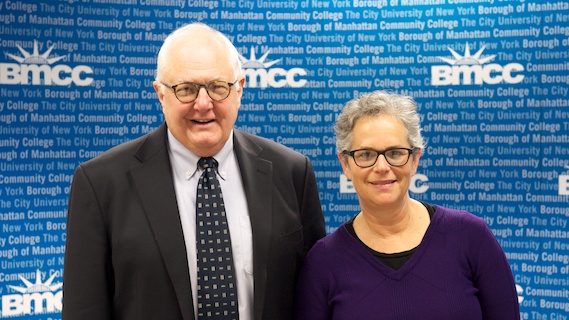
Thanks to the vision and generosity of The Derfner Foundation and of its trustee, Jay Lieberman, BMCC will soon house a state-of-the-art Communication Center where students from every department can refine their basic speaking skills.
The Center’s development will be spearheaded by BMCC communication studies professors Lee Ritchey—who brings to the classroom, many lessons learned from voicing hundreds of commercials and appearing in over 30 feature films and television shows—and Hollis Glaser, chairperson of the Speech, Communications and Theatre Arts department.
“This semester the Communication Center committee—headed by Professor Helen Huff, the department’s former Non-Native Speech Coordinator, and including professors Benjamin Haas, Judy Noble and Lee Ritchey—will review software and hardware for the lab,” says Professor Glaser.
“They’ll look at possible lab setups, and begin planning for personnel. Also, we’ll focus on helping the faculty get ready, by incorporating sessions at the Communication Center into their curricula.”
Slated to open in late Summer 2014, the Center will be located in BMCC’s main classroom building at 199 Chambers Street, room S-635.
Lifelong tools for success
Not only students, but faculty and staff are welcome to use the Communication Center as a valuable resource on campus.
Participants will strengthen their confidence and skills with a variety of linguistic exercises, working at soundproof computer carrels, and with headphones. The room will also be set up to accommodate group discussions, lectures and presentations.
According to the National Communication Association, there are 74 communication centers at colleges or universities around the country—ironically, though, only four are housed in community colleges.
“Here at BMCC, our students come from a huge variety of backgrounds,” says Professor Glaser. “Many are speaking English for the first time, or learned a version of English at home from parents who don’t speak it as their first language.”
While the field of communication “does not prescribe how people should talk, we look at how people talk, and we study it,” she explains.
“We appreciate the compelling drive our students have, to continue their educations and enter their careers, and we know they want to comport themselves professionally—yet they find themselves at a disadvantage in situations such as interviews, where if they don’t speak a particular way, they won’t get that first important internship or job.”
The new Communication Center will support those students by providing lifelong tools to express their talent and intelligence—whether in a conversation, interview or classroom presentation.
The goal is clarity, not ‘accent reduction’
Lee Ritchey guides students to examine their own pronunciation, and shares valuable strategies useful in “code switching,” or moving back and forth between languages and dialects—a skill many younger New Yorkers have practiced all their lives.
“I was always really good at doing dialects,” he says.
With hundreds of acting credits—a few years ago, he played Sigourney Weaver’s husband in the movie Infamous—and experience working as a dialect coach with actors, he has a rich understanding of how speech is formed.
“For example, if you are an actor speaking with a Russian accent, you use the back of the mouth, or throat, to create words,” he says, “and if you’re speaking with an English accent, you form words from the front of the mouth.”
He finds that his students at BMCC benefit from that kind of understanding, and from exercises such as learning the International Phonetic Alphabet (IPA).
“We help them recognize the alphabet of sounds in their own and other’s speech,” he says, “and once they’ve identified their own linguistic patterns, they can adapt them for more clarity and better communication.”
Professor Ritchey is emphatic though, on one point: “I tell my students, ‘I don’t want you to sound like me’.”
“The goal isn’t ‘accent reduction’,” he says. “It’s actually individual pronunciation and pace—not accent—that determines your understandability.”
In addition to exploring the physical delivery of words, he helps students build awareness of the non-verbal and cultural aspects of exchanging ideas; of understanding and being understood by others.
“Our discipline is communication,” says Professor Glaser, “so we look at human communication across many situations. We study interpersonal communication, we study mass media, mediated communication—I’m sure there are a hundred dissertations out there right now about Twitter.”
On the other hand, she says, “We do not study grammar, we do not study phonetics—but then it became evident that our students needed that kind of support, even outside their English classes.”
And now, they’re going to get it.

